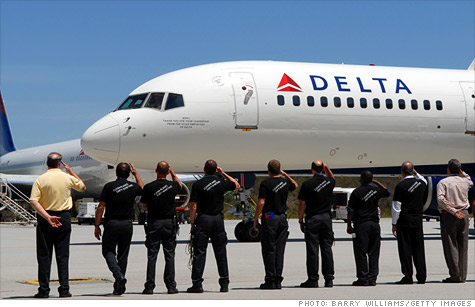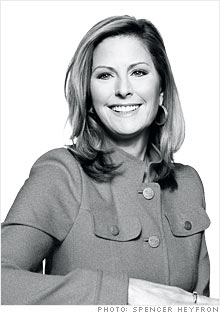Search News

FORTUNE -- How many ways are there to sidestep Congress' refusal to make it easier for unions to organize? Let us count them. No, better than that, let's add yet another example -- this one involving Delta Airlines -- to the growing pile of end-runs around Congress to reward a constituency this White House badly needs at its side in next year's presidential election.
Labor leaders bet big on an Obama victory in 2008, hoping Congress would enact, and the Democratic president would sign, "card-check" -- legislation designed to turn around labor's sagging membership rolls by ending secret-ballot elections in organizing drives. But card-check has never been able to pass the Senate -- not even when Democrats took over Congress in 2006. Instead, presidential appointees friendly to labor are deploying agency muscle.

The latest example is taking place largely out of sight -- at the National Mediation Board, a little known agency that oversees union elections for railroads and airlines. Late in 2010, flight attendants for the nonunion Delta and its unionized Northwest Airlines (acquired in a 2008 merger) voted thumbs down on joining the Association of Flight Attendants. The board -- where two of the three members are former top union officials -- reacted by investigating Delta for "interference" in the election, prompted by union claims that the company circulated too much literature.
Another vote is likely to follow, even though this was the third time Delta (DAL, Fortune 500) flight attendants had rejected the union. And here's another twist: The union lost that November vote even after the NMB changed the rules -- in place since the 1930s -- to require that only a majority of those who vote, not a majority of the workplace, needs to sign off on unionization.
"They voted under new rules that the unions asked for," Delta CEO Richard Anderson told Fortune via email. "They've done everything asked of them. And because they said no to union representation, their decisions aren't being respected; they're being held hostage."
Two years after the merger, flight attendants are still operating under different pay scales, and face restrictions on transferring to new locations or changing jobs.
On average, nonunion Delta flight attendants take home 12% more than their unionized Northwest counterparts (based on a typical 75-hour-a-month schedule); they enjoy more generous profit-sharing and retirement matches from the company; and they don't have to dole out $43 a month in union dues. (Delta ranked No. 1 among airlines in this year's Fortune Most Admired Companies list).
Delta's pilots and flight superintendents have been unionized for decades, but 85% of its workforce is nonunion -- and employees ranging from meteorologists to aircraft maintenance technicians have turned their backs on unions nine times since the merger.
The Delta flight attendant vote offers a telling microcosm of why labor is so desperate to change the rules to make it easier to organize. Only 11.9% of all workers (and only 6.9% of private sector employees) belonged to unions in 2010, compared to 20% in 1983. In the Delta vote, the flight attendants union not only lost 13,000 potential new members, but also 7,000 Northwest flight attendants already paying dues. That's a big financial hit.
Changing the rules is a strategy also deployed by the higher-profile National Labor Relations Board, where the President opted for a recess appointment of union lawyer Craig Becker after it became clear his confirmation would be blocked by Republicans (backed by alarmed business groups), along with a handful of Democrats. Last week, NLRB proposed sweeping new rules cutting the amount of time available to employers to make their case prior to a union vote -- an action the Chamber of Commerce rightly denounced as a "another not so cleverly disguised effort to restrict the ability of employers to express their views" during a union campaign.
That move followed an NLRB action in April accusing Washington-based Boeing (BA, Fortune 500) of illegally investing in a $2 billion assembly facility for its 787 Dreamliner in South Carolina, creating 1,000 new jobs in that right-to-work state. The NLRB claims Boeing is retaliating against striking machinists at its Washington state factories. But South Carolina Governor Nikki Haley more accurately describes the NLRB action as an unprecedented attempt to mandate where a private company can create jobs.
Earlier this month AFL-CIO President Richard Trumka President warned Democratic politicians that they had better deliver for organized labor if they want financial help in the 2012 elections. "For too long, we have been left after Election Day holding a canceled check waving it about -- 'Remember us? Remember us? Remember us?'...Well, I don't know about you, but I've had a snootful of that shit," Trumka declared. "If [political] leaders are not blocking the wrecking ball and advancing the interests of working families across the country, working people will not support them."
It's pretty obvious that's the message the White House and its allies are hearing. But with the economy stuck in mud, it would make more sense to listen to these telling comments from Delta's Anderson: "Attacking American businesses directly undermines the administration's stated goal of encouraging job creation and economic growth. Delta has created new jobs, but unfortunately this environment makes it difficult to predict what we will be able to do going forward." ![]()
| Overnight Avg Rate | Latest | Change | Last Week |
|---|---|---|---|
| 30 yr fixed | 3.80% | 3.88% | |
| 15 yr fixed | 3.20% | 3.23% | |
| 5/1 ARM | 3.84% | 3.88% | |
| 30 yr refi | 3.82% | 3.93% | |
| 15 yr refi | 3.20% | 3.23% |
Today's featured rates:
| Latest Report | Next Update |
|---|---|
| Home prices | Aug 28 |
| Consumer confidence | Aug 28 |
| GDP | Aug 29 |
| Manufacturing (ISM) | Sept 4 |
| Jobs | Sept 7 |
| Inflation (CPI) | Sept 14 |
| Retail sales | Sept 14 |